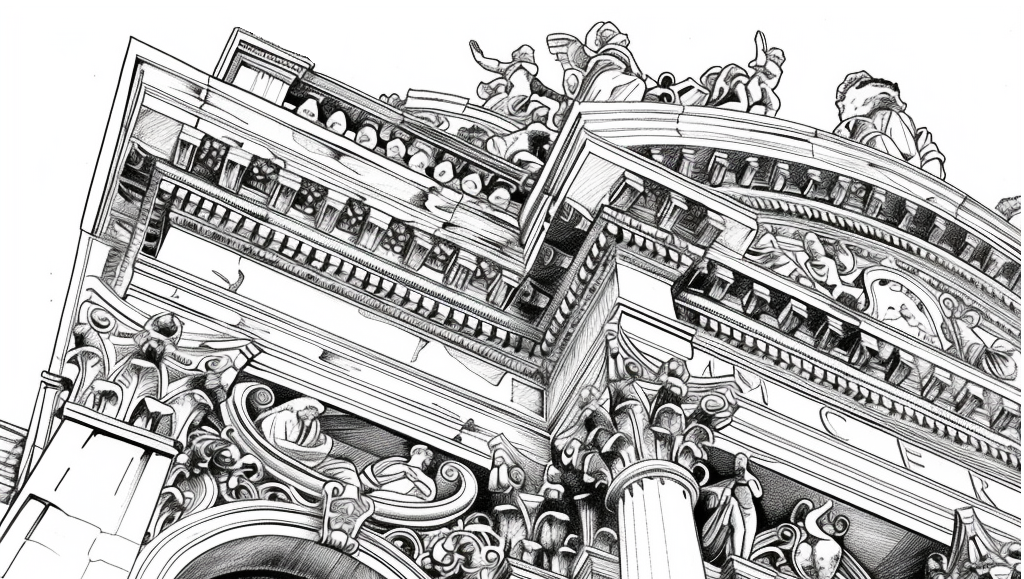Call for Papers

Call for Papers - Vol. 3, No. 5 (2026) - (pdf eng) (pdf ita)
Topic: Signifying Sign
Drawing is an expression and, therefore, not a neutral gesture. Every line drawn, every mark inscribed on a surface, every variation in thickness or rhythm, contains a tension between intention and meaning. The sign transcends its condition as a graphic mark by associating itself with gesture or symbolic reference, becoming the bearer of meaning within a signifying construction. Drawing, as a language, produces reality in a place, the represented one, where technical abstraction encounters the expressive dimension, generating meaning through the sign. The significant sign is therefore defined by its semantic function, producing meaning beyond mere measurement; it activates the imagination and organises thought within the image. In any drawing, what matters is the meaningful charge each sign carries. In an era marked by digital drawing, software generates perfect, infinite, editable and replicable signs, yet not all of these signs truly signify something. Drawing remains significant when it carries an intention that produces a reading in the viewer, like an open sign awaiting interpretation, allowing itself to be inhabited by doubt. Its strength lies precisely in not being exhausted at first glance, but in holding attention and generating questions. In this sense, drawing, as a tool of design, is first and foremost a critical site, a space for thought, and - precisely in its constant search for simplification - a critical synthesis and, at the same time, a field of resistance to simplification.
This call for papers invites interdisciplinary contributions that explore the meaning, application and challenges associated with the encoding and decoding of the sign through theoretical, empirical and practice-based research, proposing new perspectives or deeper insights in concrete or abstract contexts - historical, contemporary and future.
Papers, in the form of essays/articles, following the editorial standards, should be submitted to the journal's editorial office by the following dates:
Abstract: February 20th, 2026
Full paper: April 1st, 2026
Publication: June, 2026
__________________________________________________________________________________________

Call for Papers - Vol. 2, No. 4 (2025) - (pdf eng) (pdf ita)
Topic: To Shape: Order and Measure
Order and measurement occupy a foundational role in the disciplines of architectural survey and graphic representation, constituting the conceptual framework through which architecture is examined, interpreted, and conveyed. These notions have traversed historical periods and disciplinary boundaries, serving as enduring pillars of human thought and scientific inquiry. In the context of architectural survey, measurement transcends its purely technical function to become an interpretative tool - one that enables a deeper comprehension of form, its cultural significance, and its relationship with its spatial and environmental context. Measurement articulates rhythm, module, and proportion - principles that not only organise physical space but also disclose the underlying design logic and semantic structure, thus transforming the built environment into a meaningful and symbolically charged place. In graphic representation, measurement assumes the form of a visual language capable of embodying theoretical reflection and rendering abstract concepts visible. Proportional relationships among architectural elements become narrative devices through which the meaning of form is conveyed beyond its geometric configuration. An arch, a column, or a façade are not merely spatial constructs, but formal expressions of order that embody the aesthetic and functional values of a particular epoch or cultural milieu. Through the act of measuring, modular relationships are established, enabling the articulation of architectural components into coherent and harmonious systems.
These systems are often grounded in a conception of proportion that, across architectural history, has been interpreted and formalised in diverse ways: from the golden ratio in classical antiquity, to Renaissance regulating lines, to the modular grids of the Modern Movement. Each historical period has employed order and measurement as instruments through which to assign meaning to architectural form, engage with the surrounding environment, and respond to both functional demands and symbolic aspirations. The relationship between order and measurement therefore extends beyond the realm of technical precision, encompassing broader philosophical and cultural dimensions.
To measure is to impose intelligibility upon the apparent disorder of the real, to reveal latent structural principles, and to articulate them within a legible and communicable system of representation. Within architectural practice and its graphic expressions, order and measurement emerge as critical tools—not merely for describing the world, but for interpreting and shaping it.
This call for papers seeks interdisciplinary contributions that investigate the meaning, application, and epistemological challenges associated with order and measurement, through theoretical, empirical, or practice-based research. Submissions are invited that offer new insights or perspectives across historical, contemporary, and speculative future contexts
Papers, in the form of essays/articles, following the editorial standards, should be submitted to the journal's editorial office by the following dates:
Abstract: August 10th, 2025
Full paper: October 15th, 2025
Publication: November, 2025
__________________________________________________________________________________________

Call for Papers - Vol. 2, No. 3 (2025) - (pdf eng) (pdf ita)
Topic: Models, Shapes and Geometries
The model embodies the essence of representation by translating abstract concepts into spatial configurations that are comprehensible and analysable. In this process, geometry is an organising principle, guiding formal development through proportional relationships, metric rules, and compositional schemes. The model, governed by the rules of geometry that ensure its coherence, becomes an expression of thought, an intermediary between the conceptualisation and materialisation of forms according to a universal language capable of transcending disciplinary boundaries. Descriptive geometry, a cornerstone discipline of graphic representation, is a crucial bridge between spatial conception and formal realisation. It fosters a deep understanding of the relationships between three-dimensional objects and their two-dimensional representations. In this context, the ability to model, analyse, and communicate forms becomes essential for scientific and technological advancement. Geometric models understood as theoretical and operative representations, play a dual role: on the one hand, as heuristic instruments for investigating form and structure; on the other, as synthetic devices enabling the transmission of complex knowledge. The graphic description of geometries goes beyond an illustrative function, becoming an autonomous language capable of generating meanings and interpretations, continuously evolving through the adoption of digital tools. This dynamic relationship between form and geometry extends to the entire Drawing process, from initial conception to realisation, supporting the integration of diverse disciplines. In an era characterised by the hybridisation of physical and virtual realities, descriptive geometry is not merely a means of visualising the real but a key to reinterpreting it, translating it into models that expand cognitive and expressive possibilities.
The proposed theme for the call aims to encourage reflection on descriptive geometry and methodologies that not only deepen the understanding of forms but also provide a robust framework for addressing the challenges of spatial complexity. Contributions are encouraged and welcomed in the form of theoretical reflections, systematic reviews, meta-analyses, qualitative and quantitative research, best practices, field experiences, and analyses of the thinking and graphic techniques of drawings and works that, over time and in the present day, have contributed and continue to contribute to the development of critical thinking on the science of representation.
Papers, in the form of essays/articles, following the editorial standards, should be submitted to the journal's editorial office by the following dates:
Abstract: January 15th, 2025
Full paper: March 1st, 2025
Publication: May 2025
__________________________________________________________________________________________

Call for Papers - Vol. 1, No. 2 (2024) - (pdf eng) (pdf ita)
Topic: Drawing: Interaction Spaces
The proposed topic for the call aims to provoke a broad and detailed reflection on the role of Drawing in shaping places of imagination, in representing or suggesting settings and spaces, including digital ones, where critical interpretation or analysis activities can converge. Reinterpreted or abstract places that support design and dialogue, or digital spaces in the form of databases. In each case, drawing structures the signifier and conveys it through images or models, in forms and compositions of signs provided with grammars aimed at communication and interaction with knowledge. The need to delve deeper into this narrative dimension of Drawing stems from the necessity to offer a perspective on the inclusive and participatory processes that characterise research, specifying the role of representation as a form of dialogue that transcends scientific disciplines.
Theoretical reflections, systematic reviews, meta-analyses, qualitative and quantitative research, best practices, field experiences, analysis of the thought and graphic techniques of drawings and works that, over time and in the present, have contributed and continue to contribute to the realisation of critical thoughts on the science of representation are expected and welcomed.
Papers, in the form of essays/articles, following the editorial standards, should be submitted to the journal's editorial office by the following dates:
Abstract: September 1st, 2024
Full paper: October 15th, 2024
Publication: December 2024
__________________________________________________________________________________________

Call for Papers - Vol. 1, No. 1 (2024) - (pdf eng) (pdf ita)
Topic: Drawing between Tradition and Innovation
The first issue of the journal aims to explore the relationship between traditional drawing and the new frontiers of the science of representation, promoting a discussion on the graphic values and the persistence of the sign in the various meanings characterising the research products. TRIBELON intends, in this issue, to relate the contribution of drawing to manuals, specifically the drawing treatises, and the transformation of the sign and graphic language in the narrative of architectural components with a dual focus on the past and the future. The theme also concerns the evolution of teaching practices of the discipline in architecture schools, particularly in relation to recent developments in digital representation practices. The need to consider this aspect as a starting point for the journal arises from the necessity to define an evolutionary process in drawing to guide the view towards the dimension, even historicized, of representation as an expression of human action concerning the definition of socio-cultural contexts.
Theoretical reflections, systematic reviews, meta-analyses, qualitative and quantitative research, good practices, field experiences, analysis of the thought and graphic techniques of drawings and works that, over time and currently, have contributed and contribute to the realisation of critical thoughts on the science of representation are expected and welcomed.
Papers, in the form of essays/articles, following the editorial standards, should be submitted to the journal's editorial office by the following dates:
Abstract: April, 1st 2024
Full paper: June 1st, 2024
Pubblication: July, 2024
